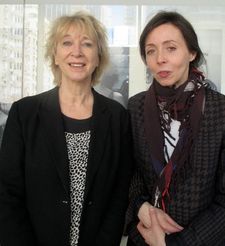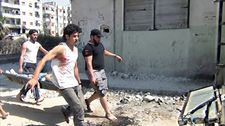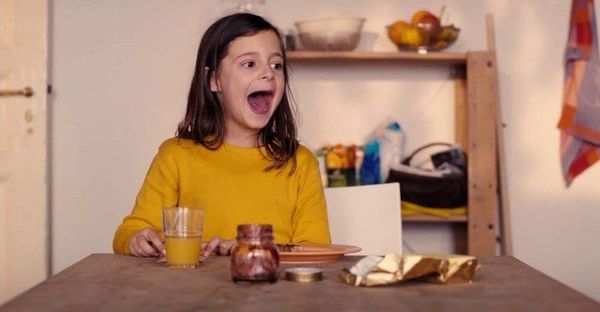Anne-Katrin Titze: I loved The Strange Little Cat.
Jytte Jensen: Yes, it's wonderful. It's one of the first films we invited, actually.
AKT: That does not surprise me. It's very difficult to describe.
 |
| Jytte Jensen with Anne-Katrin Titze on New Directors/New Films: "It's maybe the most adventurous and surprising yet." Photo: Anne-Katrin Titze |
AKT: People including the cat, the dog, the rat , even the oranges.
JJ: Exactly, it's very true. Equal opportunity to animals and humans.
AKT: It's not transformation but that equality reminds me of Michelangelo Frammartino's film about the shepherd and the goat and tree and charcoal. The one before his 2013 Alberi that screened during last year's Tribeca Film Festival at MoMA PS1?
JJ: A film I loved. The Four Seasons [Le Quattro Volte, 2010]. The same thing happens in another film in this series, Of Horses and Men. The Icelandic film which is trying to locate - and doing a very good job of it - the animal in man, and the human in the animal.
AKT: With a lot of humour.
JJ: With a lot of humour and stunning landscapes. The way that the director [Erlingsson] sets it mostly in the outside and uses the spring, the autumn, the winter to characterise and help his story develop is done really inventively.
AKT: When you program at MoMA, you usually don't do it together with five other people.
AKT: How long have you been a part of it?
JJ: I'm not exactly sure, 12 years, maybe 15. I think by now, I might be the one who has been on there the longest. Until last year, it was by no contest, Larry Kardish was one of the founding people for ND/NF, so he had been on it for 42 years. Now he is retired and it's the first year, so it's very different. One of the advantages of having six people with very different taste and very strong opinions, who really argue for what they want, is that we get a really broad, widely informed, rich programne. Not everything is by numbers. If a couple of people are particularly behind a film and can really argue why that should have a place in the programme, we do it.
AKT: How would you describe this year's selection?
JJ: It's maybe the most adventurous and surprising yet. But I have to say that I kind of feel that every year. This year, the filmmakers are helping us because every film is taking chances in its own way. All filmmakers have a very poignant personal view of what they want to do and how they want to present their point of view.
AKT: The Vanquishing Of The Witch Baba Yaga is a good example of the poignant personal perspective.
JJ: It's amazing. Very inventive, so accomplished. [Director Jessica Oreck] uses all the forms in the book to knit together this incredible story through the times.
AKT: Also emotionally involving. I wanted to go back and re-read some of the quotes.
JJ: That's good because then you know you have seen something that feeds your imagination and your knowledge and you want to sort of puzzle out what were her inspirations. But she had so made it her own, to really produce this indictment of the way we treat nature.
AKT: The serious and the light go hand in hand in some films.
 |
| Obvious Child. "It's really interesting to have a breakthrough performance by Jenny Slate" Photo: Chris Teague |
AKT: One of the screenings of Obvious Child will be held at MoMA PS1.
JJ: Yes, as the centerpiece. It's a group of mostly women from Brooklyn who've made it. Very talented people, all of them. Gillian Robespierre is a directing talent to take notice of. We had the centerpiece last year at PS1 and it works really really well in the tent. We have a little reception before or after. Lots of young people, a little bit different audience.
AKT: I told Marian [Masone] that I have never seen so many animal titles in one programme.
JJ (laughing): I didn't notice that. Mouton, The Strange Little Cat, Of Horses and Men, Japanese Dog, Fish and Cat. You are absolutely right. So that's the theme. No, it is not.
AKT: No, I know you don't look for themes.
JJ: This year the selection is so diverse it's hard to pinpoint any. That you've noticed all the animalistic things here, that's very funny. I would like to point out the hybridity of the films. But there are two films, Return To Homs and We Come A Friends that are almost traditional documentaries but they distinguish themselves in different ways. Return To Homs is perhaps the most immersive film you've ever seen about being inside a war, the civil war in Syria and more directly in Homs. You follow the goalkeeper of the Syrian soccer team and he becomes a freedom fighter. He is also a poet and you see how he creates great rousing songs for demonstrations and you see how he, little by little together with his friend who is a videographer and there to document the demonstrations against the machine, how they, little by little go towards armed resistance. It's something you don't get from coverage on television. You never get this human perspective and an understanding of what's really going on in these young people's minds when they fight for the freedom of their country.
AKT: We Come As Friends does not give you easy access and also shows what we never see.
JJ: It's a marvellous film and very different from his first film in that it also stretches a little bit not in any ironic way, but gives you an almost sci-fi idea of what is happening in Sudan. The little flying machine they created themselves helps you to get into the mood of something that is very vulnerable but at the same time trying to find the truth.
AKT: There is an otherworldliness and a normalcy.
JJ: Which is so eerie that combination.
AKT: At Hunter College we had a screening of Coup de Torchon (1981) yesterday and Bertrand Tavernier came to explain his take on colonial Africa. Both films avoid any cliches screaming Africa.
 |
| Return To Homs. "Perhaps the most immersive film you've ever seen about being inside a war" Photo: Kahtan Hassoun |
AKT: And we the spectators also don't know what is going on. We are totally lost and I like very much that he dares to do that.
JJ: He is doing it in such a way that you feel comfortable being off because you know you are in the grasp of such a great filmmaker. The way he opens up this area is really magnificent and very powerful.
Film Society of Lincoln Center and The Museum of Modern Art's 43rd New Directors/New Films festival until March 30, 2014.
Read our interview with Jessica Oreck about The Vanquishing Of The Witch Baba Yaga here.
Read our interview with Marian Masone here.
Read what Benedickt Erlingsson had to say about Of Horses And Men (released in the UK on June 13) here.
Read what Michelangelo Frammartino said about Alberi here.









![Of Horses And Men. "The way that the director [Erlingsson] sets it mostly in the outside and uses the spring, the autumn, the winter to characterise and help his story develop is done really inventively"](/images/newsite/Of-Horses-and-Men_225.jpg)













